Israel's Lapid Talks Up Military Power Amid Iran Nuclear Talks
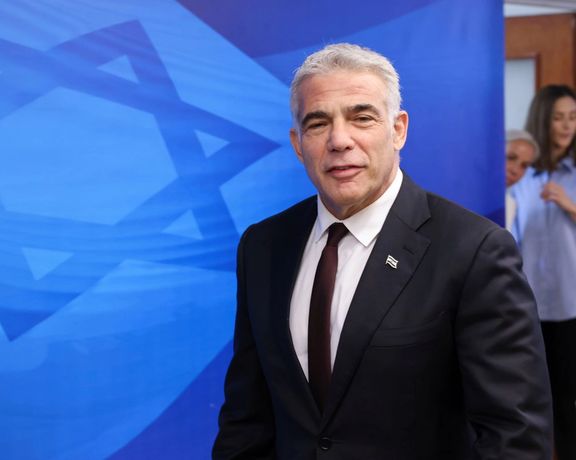
Foreign Minister Yair Lapid has claimed Israel has superior military capabilities, amid talks between world powers and Iran on restoring the 2015 nuclear deal.

Foreign Minister Yair Lapid has claimed Israel has superior military capabilities, amid talks between world powers and Iran on restoring the 2015 nuclear deal.
In an interview with Channel 12 on Friday, Lapid answering a question about Israel’s military ability to attack and destroy Iran’s nuclear infrastructure, said, “Israel has capabilities, some of which the world, and even some experts in the field, cannot even imagine. And Israel will protect itself against the Iranian threat.”
As world powers try to restore the Joint Comprehensive Plan of Action (JCPOA), abandoned by former US president Donald Trump, Israel is concerned of a new agreement that would not permanently restrict Iran’s nuclear program, while lifting sanctions giving Tehran a financial lifeline.
The foreign minister also repeated an earlier position that if Israel feels threatened by Iran’s nuclear advances, it could attack without necessarily informing the Biden administration, which is pursuing a new accord with Iran.
“Israel will do whatever it needs to do to protect its security. And we don’t need anybody’s permission for that. That’s been the case since the first day we established this state,” he said. He also added that “Israel is not against a good deal, it is only against the wrong deal.”

Iran's space rocket launch on Thursday failed to put its research payloads into orbit after the vehicle was unable to reach the required speed, spokesman said.
The rocket launch, which came as indirect US-Iran talks take place in Austria to try to salvage a 2015 nuclear deal, drew criticism from the United States, Germany and France.
"For a payload to enter orbit, it needs to reach speeds above 7,600 (meters per second). We reached 7,350," the spokesman, Ahmad Hosseini, said in a documentary about the launch vehicle broadcast on state TV and posted online.
On Thursday, Hosseini did not clarify whether the devices had reached orbit, but suggested the launch was a test ahead of coming attempts to put satellites into orbit.
Iran, which has one of the widest missile programs in the Middle East, has suffered several failed satellite launches in recent years due to technical issues.
Washington has said it is concerned by Iran’s development of space launch vehicles, and a German diplomat said Berlin had called on Iran to stop sending satellite launch rockets into space, adding that they violated a UN Security Council resolution.
France said on Friday the rocket launch aimed at sending three research devices into space violated UN rules and was "even more regrettable" as nuclear talks with world powers were making progress.
Iran’s deputy defense minister said Friday that Iran will carry out more space launches until March and added that it will use an advanced version of its Simorgh rocket, that was used in the latest launch.
Iran's foreign ministry rejected the US, German and French criticism of Tehran's launch of the satellite-carrying rocket.
"Scientific and research advances, including in the field of aerospace, are the inalienable right of the Iranian people, and such meddling statements will not undermine the Iranian people's determination to make progress in this field," it said in a statement.
There has been suspicion that Thursday’s launch might be a message, for audiences foreign and domestic, that Iran is negotiating from strength in Vienna and will not accept demands that it unliterally scale back its missile program.
Tehran denies that its space activity is a cover for ballistic missile development or that it violated a UN resolution.
A UN resolution in 2015 "called upon" Iran to refrain for up to eight years from work on ballistic missiles designed to deliver nuclear weapons following the nuclear agreement with six world powers. Some states said the language did not make such a pledge obligatory.
Iran says it has never pursued the development of nuclear weapons and, therefore, the resolution does not apply to its ballistic missiles, which Tehran regards as an important deterrent and retaliatory force against US and other adversaries in the event of war.
Gulf Arab states and Israel have serious concerns over Iran’s ballistic missiles, considering threats by Iran’s military and senior officials to wipe Israel off the map. In September 2019, a large scale missile and drone attack launched against Saudi Arabia’s oil installations were attributed to Iran.
Iran launched its first satellite Omid (Hope) in 2009, and its Rasad (Observation) satellite was sent into orbit in 2011. Tehran said in 2012 that it had successfully put its third domestically made satellite, Navid (Promise), into orbit.
In April 2020, Iran said it successfully put the country's first military satellite into orbit, following repeated failed launch attempts in previous months.
The United States imposed sanctions on Iran's civilian space agency and two research organizations in 2019, saying they were being used to advance Tehran's ballistic missile program.
With reporting by Reuters
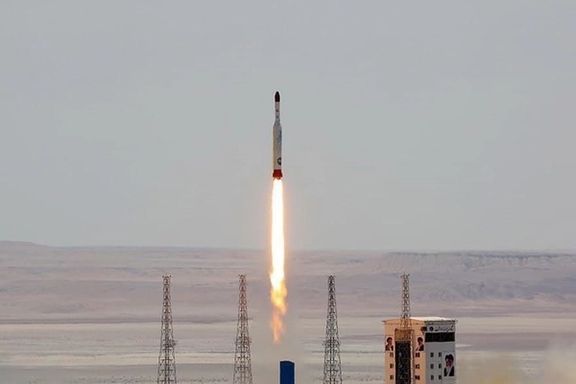
France on Friday condemned Iran's satellite rocket launch and said it was "all the more regrettable" as nuclear talks with world powers were making progress.
The French satement echoed concerns voiced by the United States and Germany.
Iran said on Thursday it had used a satellite launch rocket to send three research devices into space, as indirect US-Iran talks take place in Vienna to try to salvage a 2015 nuclear deal.
The satellite launch was in breach of UN Security Council resolutions, France's foreign ministry said.
"These activities are all the more regrettable as they come at a time when we are making progress in the nuclear negotiations in Vienna," the French foreign ministry said.
"We call on Iran not to launch further ballistic missiles designed to be capable of carrying nuclear weapons, including space launchers."
The US State Department said on Thursday Washington was aware of reports on the launch, adding such launches defy a UN Security Council resolution enshrining the 2015 nuclear deal.
A German diplomat said such launches could be used to test technology for ballistic missiles which in principle could be used to deliver nuclear weapons.
Tehran denies its space launch activity is a cover for ballistic missile development.

A former advisor to Iran’s Qasem Soleimani has said that a Russian officer in Syria once gave the Qods chief 100 Krasnopol guided artillery shells as a gift.
In an article published by Fars news agency, an affiliate of Iran’s Revolutionary Guards on Friday [Dec. 31], Hassan Ravandeh, related stories about the life and “charismatic” character of the slain commander as a tribute on the second anniversary of his killing.
Ravandeh, who was identified by Fars as one of the advisors to IRGC’s Qods (Quds) Force, is said to have accompanied Soleimani during his missions and trips across the region. He has recently published a book about his memoirs of the IRGC’s top man overseas.
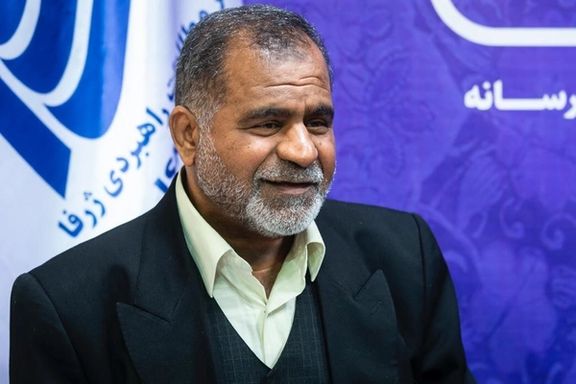
He said that Soleimani was very popular among other military men active in the region, adding that he used to bring souvenirs for the families of everybody he was involved with. He singled out an unnamed Russian commander who was stationed in the Syrian port city of Latakia that was especially fond of the Iranian commander.
According to the article, Soleimani bought a necklace for his wife and gold jewelry for his daughters before paying them a visit in Latakia. Surprised by the gifts the Russian asked how he could reciprocate the gesture, and Soleimani, reportedly, demanded that they sell him about 1,000 Krasnopol laser-guided artillery shells.
Ravandeh says that the Russian commander, who he claims is now the head of the aerospace force of the Russian army, gave Soleimani 100 projectiles because they only had 140 available in their arsenal. He added that Russia never asked for any money in return for such a gift, which according to him was worth about $7 million.

Soleimani was killed in a United States drone attack, ordered by former president Donald Trump in January 2020, as he arrived at Baghdad airport from Syria. He was Iran’s top military and intelligence operator in the Middle East, organizing proxy forces.
Soleimani played a major role in the Syrian civil war as the coordinator of Iran’s military involvement, including sending tens of thousands of regular and irregular forces to fight in support of the Syrian strongman Bashar al-Assad.
In June 2014, Iran’s Tasnim news agency in a report quoted General Mohammad Pakpour IRGC’s ground forces as saying that the Revolutionary Guard’s artillery force has upgraded its capability with deploying Krasnopol guided shells.
It is not clear if Pakpour’s announcement was related to Soleimani’s exchange of gifts with the Russian commander in Syria. Russia was still not officially involved in the Syrian war in 2014, but it most probably had a military mission to assist Assad’s forces. Russia entered the war in full force in September 2015.
It is also possible that Russia had already supplied the artillery shells before Soleimani asked for more in Syria. But whether in 2014 or later, any Russian transfer of Krasnopol shells would have violated a United Nations arms embargo on Iranimplemented in 2007, which expired in October 2020, well after Pakpour’s statement or Soleimani’s death.
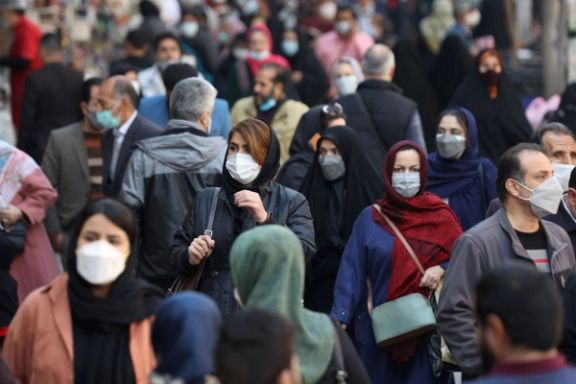
Iran's economy minister has said Thursday that the government has no immediate solution for the hardship families face, urging people to be patient.
"We have no immediate solution for the problems of families except compensation through adjusting the amount of cash handouts but there are efforts underway the results of which can be felt in a few months’ time," Ehsan Khandouzi said at a meeting with economy professors.
The cash handouts referred to amount to $3-4 dollars a month, for each person.
Khandouzi referred to a decision by President Ebrahim Raisi’s government to eliminate a scheme that since 2018 provides cheap dollars to importers of food, medicine and animal feed as a way to keep prices low. In fact, providing dollars at a rate seven times lower than the market is a subsidy meant to help ordinary people against a high, double-digit inflation rate since 2018 when the United States imposed sanctions on Iran.
Currently the street rate for one US dollar is 300,000 rials, while the subsidized dollar for food imports is 42,000 rials.
Concerns have recently been growing over the consequences of the plan which experts say will hit the lower-income families very hard as the “reform” is expected to affect the prices of staples such as bread, rice, dairy products, and protein foods severalfold.
The elimination of the subsidy is not to be implemented before late March when the budget law for the next Iranian calendar year is put into effect, but media last week reported that food prices are already rising in anticipation of the move.
The media last week reported that the price of eggs has already been affected
as production of eggs is highly reliant on chicken feed, currently imported at the subsidized exchange rate. The price of a pack of thirty eggs that sold for around 400,000 rials last week has reportedly risen to around 600,000, while municipality-run markets have also increased their price by 40,000 rials.
In US dollars, 600,000 rials is around $2 and may sound cheap, but a typical worker in Iran earns around a $100-120 a month and cannot afford meat any longer, relying on eggs as a nutritious food.
"Experts and lawmakers' remarks about the possibility of elimination of the 42,000 rial rate led to some importers to withhold chicken feed from the market," Naser Nabipour, Chairman of Egg Producers Union, told Mehr news agency Thursday.
Hardliners who constantly criticized the Rouhani administration for "neglecting people's subsistence" can no longer deny the increasing pressure on lower-income families and growing poverty that is pushing middle-income families into poverty.
"The poverty line for a family of four is at a minimum of 120 million rials a month. This means that around 70 percent of Iranians now live under the relative line of poverty," economist Morad Rahdari told Shia News Association (Shafaqna) last week. Rahdari explained that relative poverty means not being able to afford anything other than minimum essentials such as food and housing.
Rahdari blamed unemployment for the growth of poverty. According to Rahdari the real number of unemployed is 20 million, not 3 million as government statistics claim because those who work even one hour per week are considered as employed.
He also said lack of investment, resulting from sanctions, more people to fall below the poverty line in the past 12 years. "There will be crisis after crisis, lack of development, more poverty and increasing corruption if the issue of sanctions is not resolved and the country falls behind in development more than this," he warned.
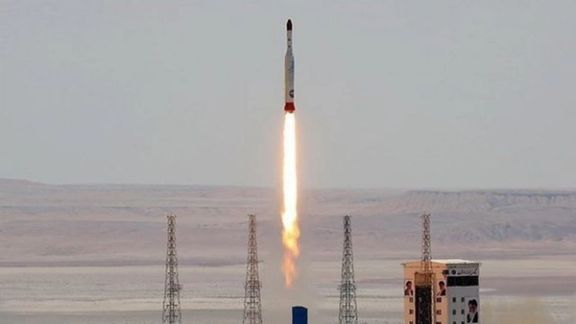
Iran vowed on Friday to launch more rockets into space before March, one day after it claimed “research payloads” were sent into low orbit around the earth.
Mehdi Farahi, deputy defense minister said Iran will use an advanced version of its Simorgh rocket, which he said has more superior technology.
Iran's annoucement Thursday of the rocket launch coincided with negotiation in Vienna over its nuclear program and could be seen as an attempt to demonstrate military prowess.
Rockets for space launch are in essence ballistic missiles that Tehran relied on as a main weapon against regional targets. Some foreign observers and governments have argued that Iran's space program is a cover for testing of ballistic missiles.
The US State Department criticized Thursday’s announcement by Iran of the rocket launch. “The United States continues to use all its nonproliferation tools to prevent the further advancement of Iran's missile programs and urges other countries to take steps to address Iran's missile development activity,” the State Department spokesman said.
Western powers have said Iran’s testing of ballistic missiles contravenes United Nations Security Council resolution 2231, which in endorsing the 2015 nuclear agreement banned Iran from “any activity related to ballistic missiles designed to be capable of delivering nuclear weapons.”